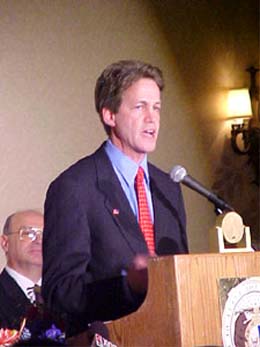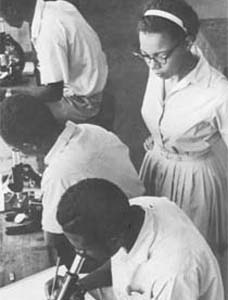
Norm Coleman, head of the Senate subcommittee that oversees the Peace Corps, is an ambitious crusader: How does a Jewish kid from Brooklyn who loved the Dodgers and led student protests in college, who served as Bill Clinton's state campaign cochair in 1996, end up as a conservative, antiabortion Republican senator from Minnesota with a Hollywood-actress wife?
Ambitious crusader
Portrait: Norm Coleman
By Terence Samuel
It's hard not to notice Norm Coleman these days. The rise to prominence in Washington of the junior senator from Minnesota has been sharp and swift. He's close to the president. He's on trips to Southeast Asia with the majority leader, and last month, after only two years in the Senate, he made a nearly successful bid to chair the GOP Senate campaign committee in the new Congress, losing by a single vote. But it is his dogged pursuit of alleged corruption in the United Nations' former oil-for-food program in Iraq that has propelled Coleman into the public consciousness as Washington's chief tormentor of U.N. Secretary General Kofi Annan.
advertisement
Coleman has called for Annan's resignation, and the senator is expected to announce shortly a new round of hearings into what he contends is a multibillion-dollar scheme of bribes and kickbacks. The program allowed Iraq to sell embargoed oil to buy food and medicine; a Security Council panel was supposed to ensure that the cash was not used to rearm Iraq. Coleman believes that the alleged fraud allowed Saddam Hussein to retain his grip on power and that the funds may now be available to the Iraqi insurgents. "I'd like to find out if this money is fueling the insurgency in Iraq and cut it off," he says. After one hearing last fall, Coleman estimated that more than $21 billion was siphoned from the program, most of it on Annan's watch. Critics challenge that number and accuse Coleman of grandstanding; recently released U.N. audits suggest the fraud might be on a smaller scale. But the senator is undeterred. "We fund 22 percent of the U.N. operating budget, so we have a stake in making sure that things we invest in are working efficiently. . . . I hope we can get to the bottom of it," says Coleman. But both admirers and detractors wonder whether Coleman's desire to get to the bottom of the U.N. allegations is just a vehicle to take him to the top.
Up the ladder. "He's very ambitious, and his recent actions really illustrate that," says Steven Schier, a professor of political science at Carleton College in Northfield, Minn. "I think you are going to see more of this, because I think this is a fellow who wants to run for the highest office you can find, and he's not going to stop."
A transplanted New Yorker who improbably served two terms as mayor of St. Paul, Minn., Coleman always seems to be in the middle of the action. He won one of the nastiest races of the 2002 campaign with 50 percent of the vote, defeating former Vice President Walter Mondale, who had stepped in as a Democratic standard-bearer after the incumbent senator, Paul Wellstone, was killed in a plane crash 11 days before the election.
From the very beginning, Coleman won admiration not just for his political skills and tenacity but for his resilience in the face of public setbacks and family tragedy. "He's a very talented politician," says Ron Ebensteiner, chairman of the Minnesota Republican Party. "What he was particularly good at was working across party lines, getting people of all parties, races, ethnicities going in the same direction."
But Coleman has inspired some detractors along the way. "He's the best self-promoter we've ever had to deal with in our state," says Michael Erlandson, chairman of the Minnesota Democratic-Farmer-Labor Party, or DFL, as the Democratic Party is known in Minnesota. "I think that his career shows that he is ambitious and opportunistic, that nothing is beyond the realm."
advertisement
A partisan view, no doubt. But just how does a Jewish kid from Brooklyn who loved the Dodgers and led student protests in college, who served as Bill Clinton's state campaign cochair in 1996, end up as a conservative, antiabortion Republican senator from Minnesota with a Hollywood-actress wife? "God only knows," Coleman says, laughing. "I've been lucky. Doors have opened for me."
Antiwar protester. Some see a gate-crasher rather than a door opener. But either way, it's a story full of twists. Coleman grew up on Avenue O in Brooklyn, one of eight children in a Reform Jewish home, and attended the same high school as New York Sen. Chuck Schumer. After graduating from Long Island's Hofstra University in 1971, where he led protests against the Vietnam War, Coleman got a law degree at the University of Iowa in 1976 and went to work in the human-rights section of the Minnesota attorney general's office.
In 1981, he married actress and model Laurie Casserly, whose mother, Lois, was one of the early leaders of the antiabortion movement in Minnesota. The couple's first child, Adam, died within weeks of birth from a genetic condition known as Zellweger syndrome. Nine years later, their fourth child, Grace, just a few months old, succumbed to the same ailment. The couple has two other children, Jacob, 18, and Sarah, 15.
The family tragedies had a profound effect. By the time he made his first foray into politics, seeking the DFL endorsement for mayor of St. Paul in 1989, Coleman was solidly antiabortion. Losing two kids "certainly strengthened my resolve to value every life," he says, and allowed him to gain some perspective. "I know what the worst thing in the world is," he says. "Everything else is manageable."
He failed to get the DFL endorsement in 1989, but in 1993 he challenged the party's choice in the primary and won, and was elected mayor in November. Very quickly, he managed to offend a number of other DFL constituencies. He clashed with teachers over vouchers and with municipal unions over privatization. So even though he got credit for revitalizing St. Paul's downtown, bringing a National Hockey League franchise back to Minnesota, and improving the city's credit rating, he was on the outs with his party. He didn't sit still: In December 1996, Coleman switched parties and became a Republican. "I've always wanted to change things, and for some reason, my old party became the party defending big government and fighting against change in government," he says.
A year later, Coleman ran for governor against his old boss and patron Hubert Humphrey III, the DFL candidate, and beat him. But in a wild three-way race, both of them lost to a political neophyte named Jesse Ventura. So Coleman went back to his job as mayor of St. Paul and before long had picked up the U.S. Senate seat.
"He's quick to bounce back," Erlandson admits. Adds Schier: "What you're seeing from him now is an established pattern of behavior. It's not like he got to the Senate and we're saying, 'What happened to Norm Coleman?' Norm Coleman has always been aggressive. [He] has always been relentless."
advertisement
Now, as chairman of the Permanent Subcommittee on Investigations, a panel of the Senate Homeland Security and Governmental Affairs Committee, Coleman and his oil-for-food investigation are attracting the attention of the world. The hearings are reminiscent of a time when chairmen of the fabled subcommittee used their powers to galvanize public outrage and catapult themselves into the spotlight. Then Sen. Harry Truman used the predecessor committee to shine a light on Pentagon waste during World War II, and Sen. Joseph McCarthy pursued his infamous anti-Communist investigations in the 1950s. Richard Nixon served on the committee, and Robert F. Kennedy was once its chief counsel.
Clearly, the subcommittee can be a powerful perch. So, is Coleman running for president? "No one in my position is going to answer that for you," Coleman says, directly sidestepping the question. He says he will seek re-election in 2008 and does not intend to run for president then. But, at 55, he notes pointedly, "I'm a young man." Point taken.
"Norm Coleman has always been aggressive. [He] has always been relentless."
Born: Aug. 17, 1949, Brooklyn, N.Y.
Family: Married to the former Laurie Casserly. Two children, Jacob, 18, and Sarah, 15.
Education: Hofstra Univ., B.A., 1971; Univ. of Iowa, J.D., 1976.
Public service: Minnesota attorney general's office, 1976-93; mayor, St. Paul, Minn., 1993-2001; U.S. senator, 2002-present; chairman, Senate Permanent Subcommittee on Investigations; member, Senate Foreign Relations Committee and Senate Agriculture, Nutrition, and Forestry Committee.











